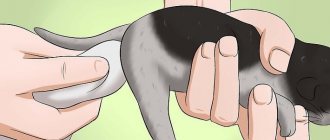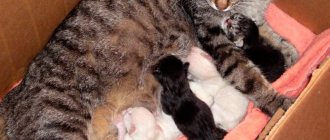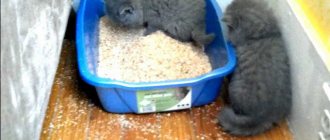Do you know when your cat is in pain? "Certainly!" – many will rush to answer with confidence. But not everything is so simple; “seeing” a cat’s pain is not at all as easy as it might seem at first glance.
Hidden suffering
Cats hide their pain, and this is natural for them. Unlike dogs and some other animals, cats can behave quite normally in appearance, despite pain. They do not publicly demonstrate their pain, but, left alone, they begin to intensively lick the sore area.
So why do cats hide their pain? The main reason is the instinct of self-preservation. In nature, a sick or injured animal is extremely vulnerable to attack. The wild ancestors of the cat tried not to make unnecessary sounds, quickly find a safe shelter and hide there. Cats are not herd animals, unlike dogs, for whom open display of their emotions helps to gain support. The cat will hide the pain until the last moment, as long as it has the strength.
Studies have shown that when an animal experiences pain, it begins to intensively produce endorphins, which affect the emotional state and dull sensations.
Cats do not show pain in the way we are accustomed to, the way we ourselves and some other pets would. Because of this feature, veterinarians and cat owners have long mistakenly believed that cats do not experience pain at all. But this is nothing more than one of the many myths about cats.
If there is no contact and trust between a cat and its owner, it will endure and hide its problem until the last moment. Severe pain is a major biological stressor and affects numerous aspects of an animal's physical health, including wound healing and resistance to infectious disease. Studies have shown that surgical cats whose pain is controlled before and after the procedure recover much better than those whose pain was not properly addressed.
Pain varies
The pain can be acute or chronic. If it's acute, it's usually easy enough to see, because... If the circumstances under which it arose are obvious (trauma, surgery, etc.), then chronic pain is more difficult to notice: there are no obvious damage or changes in behavior. Nevertheless, chronic pain detected in time can save a cat’s life, because it is an important symptom of the disease.
Causes of acute pain
may be: surgical trauma; fractures of limbs and other bones; injuries received as a result of accidents; diseases of the genitourinary system; corneal ulcers.
Most Common Causes of Chronic Pain
– arthritis (osteoarthritis and degenerative joint disease), pain due to diseases such as cancer. The animal suffers from chronic pancreatitis (inflammation of the pancreas), chronic wounds, chronic cystitis.
In addition, animal psychologists say that cats can experience emotional pain
and a feeling similar to grief in people.
Dangerous symptoms
Determining whether your cat is in pain is like playing detective: you must carefully observe and evaluate the slightest changes in your pet's behavior.
First, draw analogies with yourself. If a cat is undergoing surgery, is injured, or has a “human” disease that causes us pain, we can assume that the cat is also uncomfortable.
Secondly, pay attention to the slightest changes in your pet’s behavior. This is the first sign of pain or an incipient disease. The better you know your cat and its habits, the faster you can understand that something is wrong with it. To recognize pain, you need to know what behavior is normal for a cat: its activity level, gait, appetite, water intake, duration of sleep, sleeping position and other features.
What signs might indicate that a cat is in pain?
1. Behavior change
If a super active cat suddenly starts sleeping most of the day, this could be a sign of illness. This is also indicated, on the contrary, by the hyperactivity and restlessness of a usually calm cat.
The animal may lose interest in its favorite food and water, and its food preferences change.
The cat may become irritable and even show aggression towards other pets or people.
A sign of pain may also be a lack of desire to visit your usual favorite places. For example, a cat used to like to sit on the windowsill or on the head of the bed, but now you don’t notice it there. If she has stopped jumping as often and high as before, has difficulty climbing stairs, there has been a decrease in her motor activity in general, a change in her sleeping place to one that is easier to reach - all this is abnormal.
One of the common problems in older cats is teeth. Therefore, if your pet has become angry and gloomy, it is unlikely that it is simply due to old age. Perhaps the cat is suffering from sore teeth, and once this problem is solved, she will be as cheerful again.
2. The desire to be left alone
The cat shows in every possible way that it wants to be left alone. If she begins to growl or hiss when she is petted, touched or picked up, this is a sure sign that something is bothering her.
3. Finding a secluded place
The cat knows that pain makes it vulnerable, so it will try to hide or find a safe haven. Thus, she will be able to avoid encounters with stronger animals and not become their victim. Therefore, the animal can reduce communication with owners and other pets.
4. Sleeping too long or sleeping in one position
Pay attention to the position in which your cat sleeps. If she begins to choose one position, especially if this was not typical for her before, think about it: perhaps there is a problem behind this.
5. Licking the same area
Cats experiencing pain, in the hope of finding relief at the site of its localization, often and persistently lick the area. So, with a relapse of cystitis, cats may begin to intensively lick their belly.
6. Reluctance to take care of yourself
Being dirty and unkempt is not normal for adult animals. Cats are notoriously clean people and are great at grooming themselves. Therefore, if a pet has lost interest in its appearance, this is a reason to show it to the veterinarian.
7. Staring at nothing
Glazed and wide open eyes, especially coupled with an unnatural posture, often indicate that the animal is in great pain. The eyes in general can be an indicator of pain in a cat, regardless of whether the pain is located in the eye itself or in another part of the body. Cats in pain will have dilated pupils.
8. Changes related to the “toilet” issue and visiting the litter box
Cats with joint problems may find it painful to sit on the litter tray “as usual.” In this regard, urine may end up above the sides of the “toilet”.
9. Constant purring
A cat's purring is a means of communication and self-healing. She purrs not only to bring us joy and to show other cats that she is friendly towards them. In this way, the animal can calm down: it makes similar sounds in stressful situations, during childbirth and injury.
Various studies have shown that with the help of purring, cats are able to reduce their pain and even speed up recovery. Sound vibrations in the frequency range of rumbling promote healing and increase bone density. Your cat's constant, incessant purring is a good reason to pay attention to her.
If you notice the “suspicious” behavior of your pet described above, take it to a veterinarian for examination; do not try to diagnose the cat yourself. In addition to the fact that pain is just a symptom of the onset of a disease, be aware that many pain medications for humans are contraindicated for cats. Consult your doctor, he will prescribe the drug, dosage and dosage interval.
Irina KOSTYUCHENKO, felinologist
Nadrukavana ў “Native Prirodze”
Having brought a small fluffy miracle into the house, you get used to it and enjoy its games. If a kitten starts making strange sounds, thoughts about some serious illness immediately come to mind, and your soul becomes anxious. Good advice in such a situation can calm you down and tell you what to do.
Why does a kitten whistle with his nose?
In some short-nosed breeds (Exotic, Scottish, British, etc.), nose whistling occurs as a result of a special shortened nose structure. Nothing wrong with that. If such a whistle bothers you, your pet can undergo a simple operation at a veterinary clinic.
In some animals, the cause of whistling may be nasal polyps or problems with the cardiovascular system. A cold or rhinotracheitis is also sometimes accompanied by the whistling of a cat's nose. An examination by a veterinarian can allay your fears. If the whistling is not caused by a disease, and whistling with the nose does not threaten the life of the animal, you can do without surgery.
Why does a kitten hiccup after eating? Reasons and what to do
Hiccups can occur due to swallowing air when eating food too quickly and greedily. Eating a large portion of food also causes bouts of hiccups. It is advisable to divide the daily food intake into several doses and not overfeed the kitten. If your pet hiccups, give him a drink of water or, lay him on his back, gently massage his stomach.
The kitten squeaks before going to the toilet and does not eat anything when he goes to the toilet for the most part.
The kitten may have indigestion, which is accompanied by constipation or diarrhea. This happens when there is a sudden change in diet or the introduction of new products. The squeak may be caused by a desire to attract attention to one’s person. Watch the kitten, the baby is most likely squeaking because he cannot get used to being separated from his mother, but over time he should calm down.
If this behavior continues for a long time, a visit to the veterinarian would be a good idea. He will tell you how to help the kitten, give it a sedative, adjust its diet or undergo an examination.
What to do if a kitten squeaks when you pick it up
The kitten may not like your company, leave it alone if it squeaks when you approach. The animal will become more sociable as it grows up. Maybe you recently took him into the house, and he is not yet accustomed to the new environment, new people, he is simply afraid and squeaks in fear. Show the kitten your good intentions, speak kindly to him, feed him tasty food and do not bother him, then he will soon calm down and begin to seek contact with you.
The cat squeaks at night and when he sits alone
If a cat squeaks at night instead of sleeping, it means he is scared or something hurts. The absence of disease can only be determined by a veterinarian. If a healthy cat squeaks, he has nervous stress. A change in environment or life circumstances can cause this behavior. If the cat does not want to calm down on his own, he needs to buy calming medications from a veterinary pharmacy, a collar or a pheromone spray.
In this matter, many people have ambiguities, which can be sorted out in the material of this article, written in the format of questions and answers. If os...
Among the latest innovations that have been prepared for pets, it is worth paying attention to the new solution for transporting dogs in vehicles...
Have you recently gotten a kitten? These soft little bundles grow quickly and have many different needs. The kitten may scream often, which deprives the owner of peace. To calm a kitten, it is important to determine the cause of the cry and help the pet. This will strengthen the connection between you.
Steps
How to determine the cause of screaming
- Learn more about kitten development.
Kittens go through several stages during their growth process. Knowing these steps will help you understand why your kitten is squeaking and calm him down. There are three stages in total:
Determine the reason for the scream.
Kittens can squeak for a variety of reasons, from hunger to fear due to early separation from their mother. If you know why your kitten may cry, it will be easier for you to distinguish between different types of cry and find a solution to the problem. A kitten may scream because:
Remember that kittens can make sounds.
You may think that your kitten cries too often, but this may be his way of communicating with the world. Understanding that all cats meow and scream, and that this is normal, will help you get used to the sounds.
Take the kitten to the vet.
If you don't know what causes the crying or are concerned about your pet's health, take your kitten to the vet. The doctor will determine the cause of the scream and explain to you how you can calm the animal.
- Tell your doctor when your kitten starts meowing a lot. Explain whether certain things make the screaming worse or worse. Remember how long the kitten was near its mother and other kittens.
- Bring your kitten's medical card with you if you have one.
- Answer your doctor's questions honestly so your kitten can get the help it needs.
How to calm a kitten
- Take the kitten in your arms.
Many cats feel calmer when they sit in a person's arms and when they are petted. It reminds them of the feeling of being near their mother. Regularly holding a kitten in your arms will socialize the animal and help it develop properly.
Stroke the kitten carefully.
This can be done next to the kitten, and when it is in your arms. This will calm the animal, stop the screaming and promote the formation of attachment.
Talk to the kitten.
Human interaction is an important factor in a kitten's development and bonding. Talk to your kitten whenever he cries and when you interact with him. This will let the kitten know that you are paying attention to him.
Play with the kitten.
Play is an important part of a kitten's development and bonding. Screaming may indicate that your kitten wants your attention, and playing is a great way to give your kitten that attention.
Provide your kitten with a comfortable bed.
A comfortable place to sleep will calm your kitten and he will meow less. Buy a special cat bed or put a soft towel or blanket in the box.
Every owner dreams of stroking and holding their pet on their lap. But why doesn’t the cat sit in your arms in response to affection, and even scratch, bite and growl with displeasure? Here are the main reasons for this behavior and ways to tame an animal and make it affectionate and gentle.
The kitten squeaks. Why is the little kitten screaming?
— If a small kitten squeaks , then first you need to check the baby’s palate. Gently pick up the kitten in your hands and hold it firmly but gently. Insert the tip of your finger into his mouth (preferably from the side) and look inside to see if there is a cleft? If not, great. But if you notice a cleft palate in your baby, take him to the veterinary clinic; an experienced veterinarian will immediately tell you whether the kitten’s cleft palate is compatible with life. Unfortunately, most often these babies are euthanized.
After checking the palate cock the kitten and check if it is gaining weight (at least 7 grams per day). It's good if everything is fine with your weight. But if the baby is not gaining weight, the cat may have little or no milk and the kitten is hungry. Start feeding your baby. This should be done after he has sucked the cat's breast. And control your weight.
— A kitten can scream if it’s cold . Place him on a heating pad while the cat is not around. Due to a decrease in body temperature, the kitten's sucking reflex may disappear and a hungry kitten will squeak.
— The kitten squeaks if the cat doesn’t lick him (doesn’t “pee, poop”). This happens if the cat is not experienced (firstborn) or something is bothering her (mastitis, endometritis, retained placenta). If the cat is inexperienced, you will have to care for the newborn yourself and at the same time try to teach the cat how to properly care for the baby. Using cotton wool and warm water, gently stroke the kitten to stimulate defecation and urination every 3 hours (before feeding). Some people find it helpful to spread sour cream or butter on the kittens' butts, then the cat begins to lick them with pleasure.
But if something is bothering the cat and she gets sick, then you will have to simultaneously care for the kittens and treat the mother. After recovery, the cat will take care of itself.
Source
Reasons for behavior
Cats are freedom-loving and self-sufficient animals. Professional trainers know that it is almost impossible to force them to do something against their will, even force a cat to sit in your arms. Cats have different personalities from each other, just like people. Some are more affectionate, patient, friendly and capable of purring for a long time on their owner’s lap, others are strict and independent, not allowing themselves to be simply petted. British shorthair and fold-eared cats are especially susceptible to this. Often the cat chooses its own place in the apartment and, if it does not want to sit in your arms, nothing can be done, but sometimes it can be tamed.
Here are the main reasons why a cat won't sit in its owner's arms
:
- The kitten is constantly on the move. If something distracts his attention, he will not sit on his hands;
- Pungent odor from the owner. The cat's nose is very sensitive and does not like the smell of lemon, orange, alcohol, spices, washing powder, creams and perfumes;
- Memories of past grievances. If the previous owner beat the kitten, offended him, or if the cat grew up on the street and is not used to affection, he may not give in and not be handled. The cat will not sit in the arms of the person who offended him;
- Some animals are so independent that they don’t like being picked up by anyone, even their beloved owner. They begin to hiss and bite in response, expressing displeasure;
- The cat does not like to sit on laps because he is afraid of heights and loss of balance;
- The cat doesn't like to sit in other people's arms. He can perceive and love only the owner, but not the members of his family;
- A street cat does not like to sit on laps, as it is unfamiliar with tenderness and affection. Over time, he begins to shun any manifestations of tenderness;
- A purebred animal. British and fold cats do not like to be handled, remaining self-sufficient and independent;
- Fear. If an animal is scared, it will not be affectionate even with its owner. Cats cannot tolerate sharp sounds, screams, they can become frightened and in this state it is difficult even to simply pet them;
- The cat does not like to sit in the arms of children, as they squeeze it and offend it. Even if the child has grown up and doesn’t do this anymore, the cat remembers the insult and no longer asks to be held in his arms.
A characteristic feature of all cats is independence, resentment and vindictiveness. They will never sit in the arms of a person who offended them, hit them, or drove them away. The cat will not do anything against its will, much less sit in your arms. You need to make her want to do it.
Reasons for refusing to eat
The cat is selective about food, sometimes even refusing its favorite treat. But refusal does not always indicate pathologies. A cat or cat may not eat for more than a day if:
- ate too much the day before;
- walk outside and eat somewhere else;
- they developed temporary digestive problems due to increased physical activity;
- they were switched to a new, unusual diet;
- the female has a week left until her heat or she is just coming;
- in the male, the rutting period is underway, he feels a female nearby;
- offended by the punishment, the owner’s inattention;
- they are given dirty dishes, spoiled food;
- The female has just given birth; on the first day (sometimes two) after they do not eat, as they have eaten a large amount of placenta.
But if a cat goes hungry for more than a day, this is already a cause for concern.
Pathological factors of food refusal:
Stress
It can be a consequence of the loss of the owner, melancholy, loneliness, fear, or other unfavorable reasons. Moving to a new apartment or house, the appearance of other pets, illness or injury always affects the psychological state of cats and provokes a refusal to eat for several days. It is not always possible to cope with this on your own; you should seek specialized help. Taking sedatives will help restore your appetite.
Also read the article on how to calm your cat.
High ambient temperature
This adversely affects the cat's appetite; heat stroke is very dangerous, since these animals do not have sweat glands. Long-haired breeds or pets with short but dense hair suffer especially from the heat. If the cat is no longer young, suffers from heart or other chronic diseases, this factor is aggravated.
Parasitic infestation
Worms, fleas, other external parasites. The cat develops vomiting and diarrhea, and its stomach becomes swollen.
If severe intoxication of the body occurs, there is a risk of rupture of the stomach, intestines and liver. In this case, deworming should be carried out under the supervision of a veterinarian.
Hairballs
They are formed as a result of licking and cause obstruction of the food tract. This problem occurs especially often in long-haired breeds. To push through the lump, there are special medications in the form of pastes.
Viral and bacterial infections
Coronavirus, rhinotracheitis, calcivirus, panleukopenia first cause a deterioration in the general condition of the animal, then primary symptoms appear in the form of sneezing, coughing, salivation and lacrimation. Refusal of food and water, dehydration usually accompany these severe pathologies. Treatment should be started immediately upon initial symptoms.
Diseases caused by pathogenic bacteria are most often secondary complications of viral infections and are accompanied by poor appetite. Treatment at a veterinary clinic is required.
Anorexia
It occurs as a result of stomatitis, dental lesions of the oral cavity, long-term use of antibiotics, and anticancer therapy. Most often it is caused by dental problems - congenital partial teeth, tartar formation, caries, and malocclusion.
Also read the article about why your cat has lost weight and what to do about it.
Systemic diseases
Bronchitis, pneumonia, pathologies of the heart, liver, and kidneys worsen the general condition of the animal, causing lethargy, apathy, and poor appetite. Specialized therapy is required.
Malignant neoplasms
Even more severe damage to the body. Anticancer therapy and sometimes surgery are required.
Urolithiasis
It is especially common cause of refusal to eat in neutered cats. Often leads to blockage of the urethra and intoxication of the body. A proper diet and constant monitoring in the clinic are important.
Poisoning
Household chemicals, rat poison, medications. The vomiting center in the cat’s brain, which is well developed due to natural features, easily provokes vomiting. This protective reaction often saves the animal’s life when dangerous substances enter the body. But from rat poison, in which the concentration of insecticides is extremely high, the cat easily dies. Every effort should be made to protect your pet from rodents. Deratization should be carried out only in the absence of pets.
Pain
Pain from injuries and wounds most often causes loss of appetite. It is necessary to alleviate the animal’s condition with the use of pain medications.
Foreign body in the food tract or stomach
This condition can lead to injuries to the gastrointestinal tract, rupture of the esophagus and stomach. Often accompanied by inflammatory processes with vomiting and diarrhea. Surgery is usually required.
How to accustom a cat to your hands
It is worthwhile to tame a cat gradually. The younger the animal, the easier it is to do this. If the kitten responds to affection, then as soon as he starts to worry and hit his tail, you should immediately let him go. These are signals that he is tired of it and has a lot of urgent matters to deal with. If he responds to affection, you can use the following techniques
- You should not pick up a cat if you smell of alcohol, citrus fruits or perfume. Any cat does not like a strong smell and will never sit on the lap if the owner smells strongly;
- You can attract his attention with food that is tasty for him. Cats instantly react to edible smells and jump into your arms if they see that something tasty is in store for them;
- An affectionate kitten will happily sit in your arms if you play with him. If the cat starts to fuss, attract his attention with food.
- The cat does not like to be grabbed and for this reason does not sit in your arms. Avoid sudden movements and do not try to hold her by force - she will remember this;
- If a cat is afraid of heights, you need to hold it under the armpits with one hand and support its hind legs with the other. She will not experience a feeling of weightlessness and fear;
- Another reason why a cat does not like to sit on hands is sudden movements and pinches. The cat can sit quietly on your lap when it is not being squeezed. Therefore, it is better to gently stroke him, but not to press him to yourself;
- Another way to get a cat to sit on your hands is to smear your hands with valerian or another cat aphrodisiac. But this method does not work if the kitten is under one year old;
- Don’t drive the cat away if he starts wanting to jump on your lap, even if you don’t have time. If you alternately caress him and then chase him away, it will be difficult to get affection from him;
- Teach children to carefully handle animals, especially adults. A cat may be afraid of children and will not sit on their lap;
- The treatment should be smooth and friendly. The cat will sit with an owner who does not scream, is calm and is not an angry person. The cat does not like to sit in the arms of aggressive individuals, especially males.
What to do if a cat bites...
I was prompted to write this article by site reader Zhenya and her cat Musya. It happens that British cats and kittens bite, and the owners do not know how to behave in this case, and what needs to be done. In fact, there can be many reasons why a cat bites, and the main thing is to understand which one is right for your case.
British kittens bite because they are teething, and if you indulge them and let your hands get torn to pieces, this behavior will become a habit, the kitten will think that you are playing with it, and will continue to bite you. Therefore, you should not let British kittens bite your hands, because eventually a biting cat will grow up.
There are two big differences when a cat only bites your hands, or chews everything in the apartment, starting with shoes and ending with the TV remote control. If the cat only bites your hands, this can be interpreted as an invitation to play or he is simply bored.
If a British animal chews on shoes, a sheepskin coat, and favorite souvenirs, then there is either a lack of vitamins or a serious gap in upbringing. On the Internet, I read that people with similar cases smear their favorite cat things with Star balm or eucalyptus oil to repel the smell.
You can also buy dried pig ears at a pet store or a small collagen “bone” in the “for dogs” section. Maybe it will be possible to switch the cat to more useful chewing.
The cat bites because he wants to show you his love and devotion. Most likely this is what happens in my case. Marsik only bites my arms, sometimes my legs, and does it with great pleasure. But I, like Zhenya, am not very pleased to walk around with bitten hands, and an adult cat has large fangs, so he bites painfully.
Source
Psychological atmosphere
The cat will sit in your arms in a calm state and environment. Noise, loud television, screams and scandals cause him tension and he does not want to sit in anyone's arms. The cat does not like to sit in the arms of some people who smoke, who are aggressive even towards them, who abuse alcoholic beverages, or who are sloppy. It happens that she categorically does not accept a family member and this cannot be changed. You can only gradually teach a cat to sit in your arms if you treat her with care and affection, avoiding coercion, and then sooner or later she will reciprocate and affectionately.
It has been scientifically proven that the sounds produced by a cat carry certain information. If we are talking about kittens, then their meowing can be regarded as a desire to express their desires and needs.
What to do if your kitten is constantly meowing?
Everything that happens to your pet should be in moderation. If you notice that he almost constantly “screams”, of course you should pay attention to this. Many people think about why they meow for no reason, but it is worth noting that often there is always a reason: psychological or physical. In normal condition, a physically healthy animal will not make unnecessary sounds. The root cause of why a kitten is constantly meowing may be hunger. Demanding food from the owner is accompanied by loud meowing and anxiety. Another reason could be that he simply requires your attention and affection. Don't forget that small kittens need to be stroked, caressed, they want to feel warm and protected. The period of weaning from the mother cat may be accompanied by a similar protracted reaction from the baby. In this case, you need to pay attention to him, play with him and be patient. It is important to check the health of your furry friend, because there are various reasons for his constant meowing. Helminthiasis is a very common disease that often worries small pets.
To avoid such problems, do not forget to have your animal examined by a veterinarian in a timely manner. If you are thinking about how to stop a kitten from meowing, then first of all think about what is the reason for this behavior of the animal. The faster you can find the cause, the faster you can eliminate it.
why does a cat meow when you pick him up
Why do cats meow?
The vast majority of cats love to communicate with humans by meowing. Cats meow only when communicating with humans; cats use other sounds to communicate with each other.
Very often cats meow when they cannot decide to take action. You have probably already noticed that cats like to stand or lie in the doorway; cats meow at those moments when they cannot make a decision when the door is closed. Therefore, the solution to this situation is to make a hole for the cat to pass through the door. By doing this, you will deprive yourself of the problem of opening the door for the cat (and, as a rule, having begged for the door to be opened for her, the cat immediately asks to go back) and the shrill meowing of the cat, begging to open the door for her.
We recommend reading: How long does it take to treat Stroke in Small Dogs?
The next reason a cat meows is begging for food. A cat meows if it is hungry, so you need to feed the cat at certain hours, 2-3 times a day. If you constantly feed your cat at the allotted time, she will understand that you will not forget about her and there is no need to ask for feeding by meowing. If you feed your cat dry food, leave the food in the bowl at all times.
Cats are excellent psychologists; they can be capricious and demand your attention by meowing piercingly. Therefore, never indulge your cat if you want to get rid of your cat's meowing. Many cats stop meowing if you don’t pay attention to them, but if you react to your cat’s whining and meowing, then she will understand that this is how she can draw your attention to herself. It is advisable to feed, stroke, and pick up the cat only after it stops meowing. As soon as the cat stops meowing, pet her and give her a treat.
Another option for dealing with a cat's meowing is to spray water from a spray bottle. This method is extreme. The cat will have an association between meowing and water that is unpleasant for cats. However, this method should not be used often, because the cat's meowing can mean pain or
Source
Reasons for a kitten's constant cry
The reasons are different, both physical and psychological.
Hunger
Demanding food from the owner, the little fluffy ball expresses concern and begins to meow loudly. Treat your pet to something tasty, he will calm down and won’t bother you
you with our “cry”. Below is an approximate diet for a small kitten.
- Meat. When preparing food for a small pet, you can only use poultry, beef, lamb or horse meat. The meat must be boiled first. Do not buy pork meat for your kitten
under any circumstances , it contains a lot of fat and may contain helminths. - Fish. Despite the fact that all representatives of the cat family are partial to this seafood, you should not get carried away with it. Frequent use can cause urolithiasis in a kitten. Fish should be given to kittens boiled, without seeds, and no more than once a week. Eggs can be given either raw or boiled.
- Dairy products. Instead of whole cow's milk, give your baby fermented milk products, such as fermented baked milk, yogurt and kefir.
- This mixture of cottage cheese, milk and chicken yolk is sure to please your furry friend. Sometimes you can treat him with a small piece of cheese.
- The kitten should receive chicken eggs at least 2 times a week. Their consumption has a beneficial effect on the growth of the pet and the shine of its coat.
- Be sure to include a variety of cereals in your diet
, except for “rolled oats” and legumes. - Clean water should always be available.
After eating, the kitten will stop meowing and you can calmly go about your business.
Difficult adaptation
A kitten, finding itself in an unfamiliar environment, experiences severe stress, anxiety and fear of the unknown. The baby, who has just been separated from his mother and his brothers, misses them greatly and begins to meow loudly and pitifully. This situation is especially acute for very tiny kittens (up to 2 months of age). In this case, you will need maximum patience and calm.
Young tailed pets, like children, require from the owner not only attention, but also knowledge. After all, the presence of kittens in the house does not always mean peace, games and the joy of communication. Sometimes owners suffer from not knowing how to help their young charges, because they do not understand what is happening to them. This also happens when babies meow constantly. What do they want to communicate with this? What kind of help do they require?
The kitten is meowing, what should I do?
With the appearance of a small kitten in the house, many questions arise related to the peculiarities of its behavior. For example, why does a kitten meow? This question is often asked by inexperienced owners who have never owned animals. Let's try to figure out the reasons and find out what to do in this case.
Why does the kitten meow?
So why does the kitten meow? As practice shows, the most common reasons for such behavior may be the following reasons:
to understand that a kitten is scared . He trembles, huddles in a corner, snorts and bristles his fur. Little kittens, like human children, are very dependent on their mother cat in the first months of their lives. Therefore, the baby’s fear is understandable. He was torn away from his mother, big scary people dragged him away from his native nest and maybe they are even going to eat him! The smaller the kitten, the greater its fear. Once he realizes that he is not in danger, he will calm down.
The kitten meows even if it is hungry . At the same time, he may not eat the food offered to him. Very small kittens under the age of one month suck only their mother's milk, and if their previous owners did not feed them, then they simply do not know how to drink from a saucer.
If the kitten meows even if he is already accustomed to the environment and you have recently fed him, but at the same time he constantly trembles and clings to the radiators, then it immediately becomes clear that he is freezing . The smaller the kitten, the more difficult it is for him to maintain heat regulation of his body. Very tiny babies cannot do without additional heating for a long time. Their fur is thin, and they have not yet accumulated subcutaneous fat.
Sometimes the reason that a kitten meows can be due to excessive “talkativeness . Not
Source
Mother's Call
When kittens are separated from their mother, they experience severe stress. After all, a mother is a means of calm, protection, safety and immune support for babies.
At first, cat cubs simply do not know how to behave without their mother and suffer from the lack of her warmth. They're scared. It is during this period that they meow, greatly in need of the care of the mother cat. During the period of adaptation to the owner, such crying may not subside at all for hours. What should the owner do in such a situation?
You need to be patient and take maximum care of the baby. Take him in your arms, stroke him, talk to him, hold him close and warm him. The warmth emanating from you will to some extent replace the mother's. Adaptation stress in a kitten can last several days, and maybe longer if you take the baby into the house too early. It is recommended to do this no earlier than he is two months old.
Hunger
The desire to eat is the most typical reason for a kitten’s dissatisfaction and prolonged meowing. A young pet asks for food in this way, and this is normal. Perhaps you are giving him too small portions or feeding him rarely?
A well-fed kitten will sleep a lot and feel content. Maybe the baby you are feeding with dry food needs water? It should always be freely available to him.
To attract attention
Many owners believe that a young pet can stay in the house on its own for a long time and still feel good. No! Kittens need attention just like children. They really need communication, affection, and games. And if your baby stays home alone all day while you are at work, then it is natural that in the evening he will want to “tell” you how he missed you, how sad and lonely he was. By meowing, he simply attracts attention to himself. Give your baby some time, talk, play - and he will calm down.
Expression of love
Many owners are surprised: when a cat feels good, he shouldn’t meow, he purrs like a tractor. But some animals express their love for their owner loudly, and kittens simply do not yet know how to purr quietly. Again, thank the baby with reciprocal attention, stroke it, take it in your arms.
The arrival of spring
It would seem that with the onset of the first warmth of spring, instincts awaken only in adult cats. But if your kitten is no longer a baby, but a teenager who is 6 months old, then it is quite possible that he, too, is beginning to show the first signs of sexual behavior; hormones are making themselves felt. Veterinarians recommend preparing for such a period in advance. If you do not intend to have offspring from your ward, then he should be sterilized in time. In this case, the owners will be able to avoid not only inviting spring meows, complete ignorance of the owner, but also damage to household property. Sterilization is a radical way to avoid such problems. There are more acceptable options, for example, hormone therapy. Your veterinarian will help you choose a reliable remedy.
The kitten stopped eating for the second day, when you pick it up it meows, what’s wrong with it?
The day before yesterday we put anti-scratch pads on the kitten (4 months old), and last night he stopped eating. He drinks water and plays. But more often he began to lie down and sleep and follow me. Sometimes he meows..
We recommend reading: Why Vomiting in Pregnant British Cats
They gave me chicken and porridge and fish, and he would bite a little and go away and meow. I’ve always eaten premium food, but I haven’t touched it for two days now.
It looks like he's missing someone. This happens when kittens are separated from those they love: they eat less, sleep more and are less active. And some even stop playing. They meow and walk around the apartment - looking for someone they miss. (This also applies to your question about the bowl) I think that the reason is that someone is missing from the apartment or house (perhaps this someone used to feed your pet, played with it, etc.), but has left somewhere .
The cat meows to be called: In response You need to answer him: Kitty-kitty, until he comes running. Take him in your arms and stroke him, give him something tasty (from your hand) - he gets lonely.
Usually this exceeds the first days (when the kitten is torn away from his mother and brothers - he is looking for them); If the owner or someone close to your pet leaves somewhere, as well as if another pet has died or disappeared (another cat, mine are friends with a dog, for example), and your kitten was friends and played with this animal (even if the toy disappeared, this happens).
An animal is not a person, it doesn’t go to the doctor, it has instinct. And instinct says that in case of any problems, the animal stops eating so that the body can use the released energy to solve these problems, to restore the body. It is also advisable for a person to do exactly this. There are no diseases that cannot be cured with hunger. A good appetite is a sign of health and the absence of other problems. If the kitten has no visible symptoms of illness, then it may have mental problems, since it is still
Source
Blog about British cats Everything you wanted to know about British cats and more...
Diseases, pain
So, a baby cat will not meow without a reason. There is always a reason for this, but it can be difficult to recognize it, identify it accurately and eliminate it alone. So, if a young furry has become a member of your family, then you should always have a good veterinarian who can help.
A small kitten is primarily a growing organism that may encounter some problems. If the baby shows concern, you, as the owner, should immediately pay attention to this. Often breeders are faced with the question, why does a kitten constantly meow? In this article you will find the answer to it.
There may be several reasons for this behavior; as soon as you figure out which one applies to your pet, you will be able to quickly find a solution.
1. Difficult adaptation Moving to a new home is stressful for a kitten. If you have just taken him away from his mother and other kittens, then he may meow for this very reason. Very young kittens, which are not yet two months old, are especially susceptible to this stress. The solution to the problem is not difficult - you need to create conditions for him similar to those in which he lived with his mother cat. Prepare a warm heating pad for him, wrapped in a soft cloth, preferably fluffy. This way he will feel warmth similar to his mother’s and will be able to quickly fall asleep. Give him as much attention as possible, and then he will understand that instead of his mother, she has a new breadwinner and protector - a person. As a rule, it takes several days to a week to adapt, then the kitten will be able to completely relax and understand that he is at home.
2. Lack of attention If the kitten has been living with you for more than a week, but still shows signs of anxiety and constantly meows, this is a reason to think about whether you are paying enough attention to it. Domestic cats are mostly social creatures; they constantly need to feel that they are not alone. Play with the kitten more, talk to it, make contact, even if it is a little afraid of you. In the latter situation, you should not be zealous and communicate with the kitten only when he himself shows interest in you. Buy or make toys for him so that he can have fun when you are not at home. Cats need very little to be happy!
3.Health problems As sad as it may be, such restless behavior may indicate health problems. The kitten feels bad and wants to somehow show it to the owner to the best of his ability. You need to observe your pet, first of all, paying attention to how regularly he eats and goes to the toilet. If the kitten is active, eats with appetite, and goes to the toilet regularly, then most likely health problems are not your case, carefully re-read the first two points again. Most often, kittens “complain” about problems with digestion, because in the new home he has switched to new food, and the body needs to somehow get used to it. Stroke the kitten's tummy often, just as the mother cat did when she licked him. This massage perfectly stimulates the digestive system.
When a long-awaited mewing creature appears in the house, in addition to joy, many worries emerge. One of which is why does the kitten constantly meow? Most owners become concerned when the timbre of the voice changes or if the pet begins to meow at night. Zoologists say that a change in timbre may indicate that the animal is hungry or is bothered by something, or wants to go to the toilet. In our article we will talk about what to do if a cat constantly meows, and how the owner should react to this.
The reasons why kittens meow are different from why adult cats meow:
- Sometimes he says that he is stressed, especially if he has just been taken into the house. In this case, you need to let the animal get used to it and leave it alone.
- A common reason if a kitten has just been taken into the house is that it feels hungry. The fact is that the animal does not know where the bowl or toilet is; the baby is not yet accustomed to the location.
- When a kitten meows, it means that you need to play with it, as if in this way it attracts attention.
- If kittens meow outside the door at night, then you shouldn’t indulge them in this. Otherwise, it may become a habit; he will understand that he is being played with. Then the cat will react in a similar way.
- Most of all, it is an expression of love.
Kitten meows
The article allows you to understand whether such a situation is normal or not and how best to behave in this case in order to achieve the best result for the kitten and prevent it from getting sick, because sometimes such a situation indicates an illness.
The kitten meows and cannot go to the toilet or meows when walking around large and small
There are several probable reasons why a kitten cannot go to the toilet and meows when it walks big and small. These could be diseased kidneys, worms, inappropriate nutrition and a number of other equally significant reasons.
It is better to consult a specialist on this matter.
Why does a small kitten meow without voice and sound and stop, does not find a place for a reason?
There are breeds of cats that are too talkative, meowing with or without reason. In particular, these are the Kurilian Bobtail, Bengal, Siamese and Abyssinian cats. However, even a kitten of the presented breeds should not meow non-stop.
It is obvious that something is bothering the baby, or he was taken away from his mother too early.
The kitten constantly meows, but does not want milk, what should I do?
Contrary to popular belief, milk from cows or goats is harmful to kittens. If the kitten is hungry, then fermented milk products, cottage cheese, egg yolk and finely chopped meat (except pork) can successfully replace cat milk.
What to do if the cat does not sleep at night, walks and meows, what does this mean?
Perhaps the cat felt like an adult and his nightly vigils are associated with the desire to satisfy his sexual instinct. If breeding kittens is not part of the owner’s plans, then it is better to castrate the animal.
The kitten meows near the front door and on the front door or when I'm in the bathroom
This behavior of the kitten is most likely caused by the lack of attention that the small pet experiences. However, if you follow his lead, it will become much more difficult to wean an adult cat from the habit of meowing when the owner leaves the visibility zone.
Here it is important to find a “golden mean” and learn to ignore the unreasonable demands of the animal.
Why does a cat meow with a hoarse voice in the morning, after eating, on the first day after leaving the nursery?
A cat's hoarse voice, like a person's, may be due to the structure of its vocal cords or a cold.
Meowing in the morning, after eating and on the first day after leaving the kennel, if the cat is not sick, can be explained by your pet’s desire to communicate.
Why does a kitten meow when you pick it up during play?
A kitten may meow when you pick it up during play because it is in pain or discomfort, or to express its annoyance at interrupted play.
This behavior of the kitten is most likely caused by the lack of attention that the small pet experiences. However, if you follow his lead, it will become much more difficult to wean an adult cat from the habit of meowing when the owner leaves the visibility zone.
Reasons for frequent meowing in adult cats
- Common causes are when the pet is in heat, his voice becomes louder and shriller. When there is a cat at home, during sexual activity, he will scream in such a heart-rending voice that if the pet is not used for breeding, then it is better to castrate it.
- It happens that a spoiled pet will follow you and yell until the food he doesn’t like is replaced. What to do in this situation is up to the owner to decide. Maybe the owner will change the food to something else that is more beloved by the animal, or maybe he will offer to eat what they give.
- Sometimes the pet screams and walks at night, because cats are predatory animals, and night is hunting time for them. In this case, you can try not letting your pet sleep during the day or try getting another kitten. Maybe they'll have more fun together.
- When a cat meows a lot, you need to check if she needs help, maybe something hurts? This can be checked by touching the tail, paws, back, and tummy. If he doesn't react to touch, then he's fine.
How do willful beasts become tame?
Why do cats ask to be held? They constantly demand attention and are quite willful. When they come into the house as small kittens, they perceive the owner as a mother and demand care, comfort and coziness from him. Growing up, cats, on the contrary, try to subjugate their owners so that they satisfy all their needs: food, play, affection.
If the owner does something wrong, they begin to take revenge: they can bite, scratch, shit on the carpet, or turn over a flowerpot. They can be taught some rules of behavior, but their habits cannot be completely changed.
“Purr-meow. On the r-r-handles. »
Why do cats give in to your hands?
1. They want to be stroked and caressed. Sometimes you can notice that cats, when they lie on their hands and stroke them, move their paws. This habit has been formed since childhood. When a kitten eats its mother's milk, it uses its paws to stimulate the mother's abdomen to increase milk production.
2. They mark their territory, and you are perceived as an object that is located on it and belongs to them. For the same reason, they constantly rub against furniture. Cats have specific glands that secrete a secretion that has a special smell. They are located on the tail, on the sides of the head, tongue and lips. In this way, animals designate their space so that other relatives do not encroach on it.
3. We are used to being constantly in our arms. This habit is formed from childhood if the cat is constantly picked up.
4. The cat wants to eat or play. With affection he tries to gain the favor of his owners.
5. Asks the owner for protection, especially if there are strangers nearby whom he is afraid of.
6. Most often, cats climb into the arms of precisely those people who do not like them. This is due to the fact that such a person always tries to sit quietly, without attracting the cat’s attention. And the cat perceives his calmness as a symbol of favor. It doesn’t hiss or scream, which means it doesn’t pose a danger.
7. The cat wants to help you. According to modern research, cats sense bad energy and feed on it, react to changes in the human biofield and, thanks to these properties, can even treat some diseases and relieve fatigue.
When the owner caresses and strokes his furry pet, his mood rises, as positive energy charges enter his nervous system. By massaging the owner's body with their claws, cats perform a kind of massage of reflex zones.
Its effect is similar to the effect that doctors are trying to achieve with acupuncture. A cat can calm down, relieve stress, normalize blood pressure and heart function, reduce pain and inflammation, and speed up wound healing.
A sick human organ always has a higher temperature. How nice it can be to lie down after a hard day and relax your tired leg muscles! That is why the cat sleeps at the feet, getting closer to the warmth.
How to wean your pet off of you?
Try to spend more time with him, play, so that he does not feel a lack of attention.
Make him a small house, put warm bedding and toys there. It is best to use an old hat with fur or a soft toy for this purpose.
Place a warm heating pad wrapped in a towel or just a plastic bottle filled with water next to your pet.
You cannot take kittens away from their mother very early (up to 3 months).
If a kitten is separated from its mother at a very young age, it needs warmth and affection. Some veterinarians recommend sewing an apron with a pocket or wrapping a scarf around the body and wearing the baby in it so that he feels your warmth. Then the cats, feeling your warmth, grow up more sociable and affectionate.
Anxiety in your cat that requires you to see a veterinarian
If your cat is worried when going to the toilet, then there is no need to worry if it has been dewormed. However, all necessary conditions must be met:
- If a cat meows and scratches its ear at the same time, then you need to go to the veterinarian, he may have a mite or an allergy.
- If your cat is trembling and meowing, then you should pay attention to whether she is feeling hungry or cold. If not, then you need to visit a veterinarian to check if he has a spinal injury.
- If an adult animal goes to the toilet and meows, then this is a reason to visit the clinic; it may have urolithiasis.
- It is necessary to visit a veterinarian if your pet meows, goes to the toilet frequently and refuses to eat.
- If your pet makes hoarse sounds, as if he is experiencing interference, then you definitely need the help of a specialist; perhaps he has worms in his heart, or there may be a viral disease.
- If the cat makes a heart-rending cry, then perhaps he has some kind of injury or pain in the abdomen. If the stomach is hard, like a swollen drum, then you should immediately consult a veterinarian. In a normal position, the tummy should be soft and light pressure should not cause any discomfort to the animal.
Impurities in food
If there are contaminants or foreign objects in the food, cats may refuse to eat. Sometimes it can be difficult to feed your pet medicine or vitamins. Then the owners hide them in food. Cats are very sensitive: if they notice an additive in their food, they may refuse it. In this case, you need to stop putting medicine in food. Wait until your pet starts eating normally again. If you need to give your cat medicine, it is better to give it separately from food or add it to a special, separate portion of food. This will prevent your cat from developing an aversion to the main food.
How to calm a screaming cat
What to do if a previously calm and even lazy cat is constantly yelling at home? The owner has only one option - a consultation with a veterinarian. If an animal has any disease, the doctor will cure it and make life easier for the owner.
Perhaps the pet is showing anxiety due to unsatisfied sexual activity. The use of hormonal drugs that reduce cravings in a pet is harmful to its health. There are two options here: either let the cat go for a walk or castrate him.
You can try feeding your pet more nutritiously at night; it will require more energy to process food. Consequently, the cat will sleep peacefully at night.
You need to be careful with drugs such as Kot-Bayun or Feliway. They can only be used in extreme cases, as they are dangerous for the animal; first you need to be sure that the pet does not have any health problems.
An attentive owner will always determine by the timbre of his pet’s voice whether he has any health problems. The necessary attention and care will help to survive this difficult period not only for the cat, but also for the owner.
How to wean a cat from the bad habit of yelling?
Advice! The best way to ensure a peaceful life together with an animal is not to spoil it and not allow everything it wants at the first request.
Cats are smart enough to understand that humans don’t always like their meowing, and that their owners are ready to make any sacrifice just to stop it right this second.
This is not even a question of why a cat constantly meows and screams if you have indulged all her whims since childhood, the question is different: is it possible to fix everything?
It is possible, but for this you will have to stock up on Spartan endurance and angelic patience. The cat, out of habit, will demand and meow, and the owner should simply ignore her cries. If you are not confident in yourself, buy earplugs or listen to music through headphones, because a constant cat concert is unbearable.
Try not to spoil your cat so that he doesn't meow all the time.
If a cat asks to be held in your arms with a heart-rending meow, do not follow the animal’s lead, caress it when it is silent and behaves calmly. The same goes for treats. Regular food should always be present in the cat's bowl, and the pet will receive yummy food only when it is silent.
The cat will learn this logical chain: “I’m silent - I get what I want” quite quickly. Usually training takes 5-7 days.











